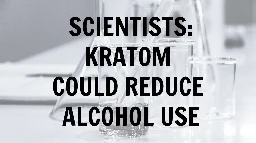Kratom Could Reduce Alcohol Consumption, Say Scientists
Kratom Could Reduce Alcohol Consumption, Say Scientists
The alkaloid speciogynine may be a starting point for low-risk treatment
Self-reports of kratom use as an alcohol substitute exist online, though they have not been as well documented in the scientific literature as other motivations for kratom use, such as substitution for opiates (Smith et al, 2023). In one survey of US residents, 18% of current users and 11.5% of past users reported they used kratom “To cut down or quit using alcohol” (Coe et al, 2019).
This motivation has also been documented among Southeast Asian users who are more likely to engage in the centuries-old traditional practice of chewing fresh kratom leaf or preparing it as a tea (vs. eating dried powder and using extracts, more common in the West). A qualitative study of 34 Thai kratom users found:
Almost all regular krathom users did not drink alcohol although some used to drink it before being krathom chewers. Krathom was believed to be an aid to those who wanted to stop drinking. An ex-drinker explained:
“After I use krathom, I can’t stand the alcohol strong smell. If I drink even a bit, I would have an extreme headache and vomit, get sick and have a hangover. I cannot work and have to take a rest.”
The study also explained that kratom use in this region of Thailand was more socially acceptable than the use of alcohol, tobacco, or cannabis, in part because of better social functioning of people who use kratom over other drugs (Saingham et al, 2013). This implies a social motivation for someone to choose kratom over alcohol.
